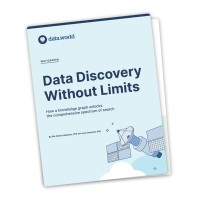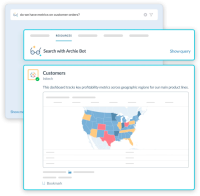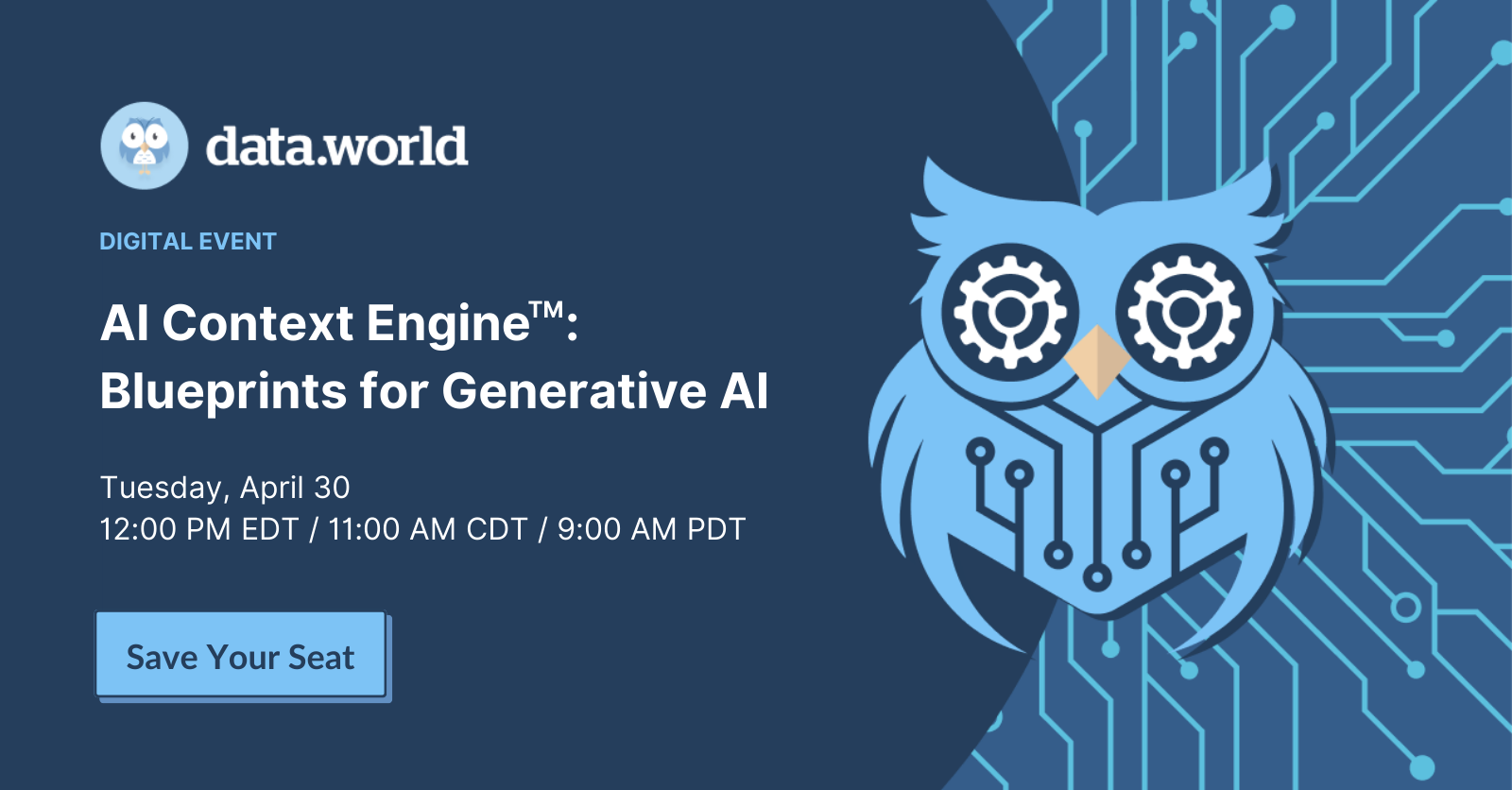Looking for an all-in-one data tool in the AI-driven market? Book a demo with data.world today.
Two prominent players in the data management space are Atlan and Alation. Both of them have a slightly different approach to empowering data teams.
Alation functions as a traditional data catalog and provides a central repository to organize and understand data assets like tables and dashboards. Data teams can search data, explore its column-level lineage, and collaborate on this platform.
On the other hand, Atlan takes a more modern approach with its active metadata platform. It goes beyond simple information storage—actively managing relationships between data sources, lineage, and usage patterns. This creates a collaborative workspace for data teams and facilitates better communication and coordination around data assets.
But which one’s perfect for your organization? Atlan is best for open architecture that’s easy to implement and scale. Alation is one of the best-in-class data catalogs for data governance, so if your main priority is data governance, Alation is better. Read on to learn how you can find the right data catalog for you.
To understand this better, you have to consider the use cases of tools and priorities of your data team. In this article, we’ll help you decide which tool to use.
Atlan: modern data catalog with personalized data discovery
Atlan is a modern data catalog that is changing how teams manage and access data. It makes data easily discoverable and accessible to everyone in an organization. By breaking down data silos, Atlan ensures that data flows freely across departments.
It also streamlines data workflows to make managing and using data simpler for teams. Why? Because this means everyone in your team—from analysts to executives—can find and use the data they need without barriers.
Atlan helps data teams catalog data. This way, it creates a single source of information for all data assets. Your teams can find what they need quickly. On top of it, Atlan also governs data to ensure it follows rules and regulations. This keeps data safe and compliant.
Simply put, Atlan removes complexity and stimulates a data-driven culture within organizations.
While Alation operates as a closed platform, potentially creating data silos, Atlan's open architecture is easy to scale and integrate with data fabric and data mesh architectures.
Features & benefits of Atlan
Atlan stands out for data cataloging and governance because it has exclusive features that bring several benefits. Here's how it can help your teams with data automation and processes:
Data dictionary management
With its data dictionary management features, Atlan eliminates data ambiguity and confusion. It captures data lineage, ownership, usage patterns, and business context to provide a central source of information for understanding and consistency.
Data mapping
Atlan simplifies complex data relationships and improves data lineage visibility. Its powerful data mapping capabilities visually represent how data flows between systems. In return, this helps you understand the transformations and dependencies better.
Data governance
Atlan ensures your data is secure, complies with rules, and quality remains consistent. It authorizes you to define and enforce data governance policies through role-based access control, data lineage tracking, and automated data quality checks.
Data profiling
Atlan gives you comprehensive insights into data characteristics to identify potential issues. It profiles your data and highlights patterns, inconsistencies, and potential biases. So, your teams can then address data quality concerns and improve trust based on its profile.
To help you get a better idea of what your business can get from Atlan, we’ve summed up its benefits below:
Atlan’s user interface emphasizes collaboration to reduce time spent searching for the right data.
Atlan’s data governance framework minimizes compliance risks and improves data security.
Its open architecture allows seamless integration with existing data infrastructure.
What are the drawbacks of Atlan?
While Atlan has many benefits, you should be aware of its potential limitations before making a decision:
Does not have AI capabilities
It does not provide advanced machine learning and AI features without additional costs. This pricing issue can strain budgets for smaller teams or startups. So, it’s difficult to access powerful AI-driven insights without stretching resources.
Inflexibility in governance automation
Its rigid data governance tools can frustrate users trying to tailor workflows to their unique needs. This inflexibility can lead to inefficient processes and slow down data management tasks. In return, it becomes hard for data teams to comply with internal policies and external regulations.
Complex governance task management
It does not have task management and notification systems. So, it’s challenging to track and complete governance tasks. Teams can miss deadlines and overlook approvals, impacting data quality and compliance.
Limited communication in DataOps
Since it doesn’t have streamlined communication tools for DataOps, collaborating and overseeing tasks becomes difficult for teams. They will struggle to identify and resolve data pipeline issues promptly. As a result, this will delay data processing and analytics projects.
Atlan Pros & Cons
We analyzed over 91 reviews of Atlan customers, and here’s what they think:
Alation: build a data culture
Alation is another data platform that builds a strong data culture in organizations. It makes data easily accessible and understandable to all users, regardless of their technical expertise. Alation’s data discovery and collaboration support lets business users easily search for and share data across the organization.
Your teams can collaborate, share insights, and improve decision-making with reliable data. And the best part is its tools ensure data is accurate, secure, and used responsibly.
Alation creates an environment where data-driven decisions are made. This, in return, promotes a data-driven culture that values trust, understanding, and collaboration. With Alation, organizations can leverage their data to its full potential.
In short, Alation prioritizes data governance, which helps companies achieve three key objectives—setting strong data policies, tracking data lineage, and enforcing secure access controls.
Features & benefits of Alation
Alation has a comprehensive suite of features that address key data challenges. This makes it a popular choice for businesses that need data cataloging and governance solutions.
It automatically extracts data definitions and lineage information from various sources and synchronizes data. This reduces manual data entry efforts and ensures all users access the most up-to-date information.
Centralized data catalog
It provides a central repository for all your assets—showing detailed descriptions, usage statistics, and relationships between different data sets. This helps users find the information they need quickly and understand its context.
Powerful data governing features
It allows business users to define and enforce governance policies, including access controls, lineage tracking, and quality checks. This ensures data is accurate and complies with regulations—establishing trust and confidence in data-driven decisions.
Integration with data analysis tools
It seamlessly integrates with various data analysis tools. As a SaaS user, you can find relevant data assets and access them within their preferred analytics environments. This reduces time spent searching for data and facilitates efficient analysis.
To help you get a better idea of what your business can get from Alation, we’ve summed up its benefits below:
Automation and centralized management of data minimize manual efforts and improve efficiency.
Governance features ensure data security and regulatory adherence.
Accelerate data-driven decision-making.
What are the drawbacks of Alation?
While Alation has many benefits, you should be aware of its potential limitations before making a decision:
Limited data discovery
It doesn’t have comprehensive data discovery features. There's no knowledge graph for contextual search results, which consumes more time to find specific data.
No dedicated customer support team
They also don't have a dedicated customer success team. So, you will find support and guidance issues when using the platform.
Complex data governance
It lacks easy-to-configure options. So, setting up data workflows becomes complicated.
Missing trust badges
There's no feature for embedding trust badges in BI tools. For this reason, data health status and catalog context are not visible on reports. This makes it harder for business members and stakeholders to assess data quality quickly.
Alation Pros & Cons
We analyzed over 65 reviews of Alation customers, and here’s what they think:
Now you know both Atlan and Alation. But have you thought about whether these tools are really going to support your business in the AI-driven future? They aren’t built on knowledge graphs, nor do they give contextual data discovery results.
That’s how data.world stands among these tools.
data.world: The data catalog built for your AI future
data.world is the only AI-powered cloud-based data catalog platform built on knowledge graph architecture. It goes beyond organizing your data—it uses the power of natural language and machine learning to maximize data potential.
Some data catalogs are super agile, but with bare bones functionality. Others are feature-rich, but next-to-impossible to set up and use. data.world offers best-in-class data discovery and reporting, with set up that doesn’t require months of studying docs.
You don’t need homework, you need to get going. Unlike Atlan and Alation, data.world’s data catalog is the perfect balance of comprehensive and user-friendly.
Here are some key differentiating features:
Open community
Transparent ownership
Understand connections across your data
Map data and context back to stakeholders and understand the particulars in every program rollout, because faster insights mean faster decision-making
Localized governance
Like a state within a country, localized experts know best
Localized domain experts input the context and data they know best
Others benefit from that expertise
Quick adoption
Easy to adopt and use
Teams of all technical levels can use the platform on Day One
All the governance you need, and none of the overly complicated stuff you don’t
Alignment and clarity
Alignment on reporting and analytics
When your business has grown and your data team struggles to keep up with the demand for data, gain control and efficiency to give insights that drive growth
No-code workflows
Full, multi-step workflow capabilities you can configure yourself
No tickets or technical intervention required
Useful reporting
You don’t need thousands of metrics and workflows, but you do need robust, useful reporting, like metadata quality and freshness checks
Useful reporting, out of the box
On top of the above features, three AI bots do the work for you in data.world. Here's how:
Archie bot
Archie Bot uses AI-based LLMs to help data teams find and understand data faster. You spend way less time searching for data. Why? Because our archie bot does the heavy lifting for you.
Eureka™ bot
This bot streamlines your data management. It automatically enriches your data's details, simplifies how you access data, and makes data governance easier for your team. Eureka™ Bot handles the everyday stuff so your team can focus on what's important.
Sentry bot
Sentry Bot ensures your data teams and consumers speak the same language. It helps everyone stay up-to-date on data quality and how to use the data right. It ensures your DataOps communicates seamlessly with the consumers without any hassle.
Why data.world above other data catalog apps and platforms?
Here's a breakdown of how data.world can benefit your business:
data.world operates entirely online. Users can access it from anywhere with an internet connection and scale seamlessly as their data needs grow.
data.world’s user interface is friendly and easy for everyone, from data scientists to new users.
Unlike other data warehouses or SaaS solutions, data.world uses a knowledge graph to show the relationships between different data points, uncover hidden insights, and connect data from various sources in a holistic view.
Whether your data resides in the cloud or on-premise, data.world works with both. It seamlessly integrates with both environments so you can catalog and manage all your data resources regardless of their location.
data.world is a certified Benefit Corporation, which means our mission extends beyond just profit. We aim to make it a choice you can feel good about.
Still confused about which data cataloging tool is right for you? Check out how data.world compares with others:
data.world vs Collibra
data.world vs Atlan
data.world vs Alation
data.world: The only data catalog built on a knowledge graph
data.world is the only data catalog built on knowledge graph architecture. You can review metadata, tables, and documents as objects on a graph that have some relationship to each other.
Ready to test it on your own? Book a free demo with us today.



